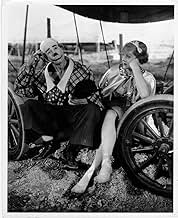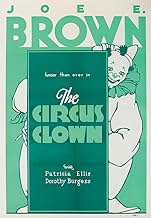Trying to follow in his father's footsteps, the son of an ex-acrobat runs off and joins a circus, getting a job cleaning up after the animals.Trying to follow in his father's footsteps, the son of an ex-acrobat runs off and joins a circus, getting a job cleaning up after the animals.Trying to follow in his father's footsteps, the son of an ex-acrobat runs off and joins a circus, getting a job cleaning up after the animals.
Charles C. Wilson
- Sheldon
- (as Charles Wilson)
Ward Bond
- Unimpressed Man in Audience
- (uncredited)
Margaret Carthew
- Audience Member
- (uncredited)
Ernest Clark
- Vaudeville Act
- (uncredited)
Alfredo Codona
- Trapeze Aerialist
- (uncredited)
Nick Copeland
- Husband in Audience
- (uncredited)
Storyline
Did you know
- TriviaAccording to a review summary in the New York Times, Joe E. Brown was affectionately pawed by a lion during one take, requiring 6 stitches in his arm. The article also points out that Brown did his own "spectacular acrobatics" - no doubles were used.
- ConnectionsReferenced in American Experience: The Battle Over Citizen Kane (1996)
- SoundtracksThe Billboard
(1901) (uncredited)
Music by John Klohr
Played during the opening credits
Also played when the trapeze artists enter the arena as part of the parade
Featured review
Some really mean circus folk in a somewhat disjointed tale
Joe E. Brown plays a dual role as young acrobat Happy and his father Chuck. In the opening scene we see Chuck Howard telling his old boss at the circus that he wants no circus posters put on his establishment. Apparently Chuck has some ill feeling toward his old employer and furthermore doesn't want young Happy anywhere near a circus. Yet, for some strange reason Chuck takes Happy to the circus anyways. Happy is enthralled with the excitement of the place and hides away in a container when the circus ships out. When found, his dad's old boss lets him stay on with the show, although it is not exactly the glamorous life he was hoping for. Instead Happy is relegated to caring for the circus animals and running errands.
One misunderstanding leads to another, and in between misunderstandings the circus folk here are just plain mean to Happy which is difficult to understand since Happy is a very nice if naive guy. There are several somewhat precode situations that don't quite play out and I have a feeling the release date probably has something to do with that - it went into release virtually at the very time the production code went into effect, so probably some of the cut scenes would yield some welcome background information. One particularly puzzling part of the story has to do with Happy's dad. In the first scene Chuck's old boss seems to admire him, he actually hires his son, but in the scenes we see Happy and the circus boss together he is calling Happy useless and joining the rest of the troupe in making a mockery of him. Why would he treat the son of an old friend that way? The circus boss mentions that alcohol ended Happy's father's career, but no further explanation or details are ever given.
Because this film reels somewhat unpredictably between comedy and pathos, it really gives Joe E. Brown a chance to show his range and he meets the challenge well. Plus he gets to display his acrobatic abilities quite a bit here, even showing off the two and a half turn somersault in the air that he was famous for in his vaudeville days. The dual role works too as Happy and Chuck really do seem to be two different people - the eager young acrobat and his father who wants to save his son from the bad experiences he had, yet can't help being proud when he follows in his footsteps.
There are no other big names of the day in this film - Brown is really the only star - yet there are a couple of interesting cameos. First there is Lee Moran who is playing a bit part here as he did in quite a few of the early talking Warner Brothers films - he had a kind of Ned Sparks-like persona. Next, a very young Ward Bond can be spotted at the end of the film as an obnoxious and unimpressed member of the audience as the circus performs.
One misunderstanding leads to another, and in between misunderstandings the circus folk here are just plain mean to Happy which is difficult to understand since Happy is a very nice if naive guy. There are several somewhat precode situations that don't quite play out and I have a feeling the release date probably has something to do with that - it went into release virtually at the very time the production code went into effect, so probably some of the cut scenes would yield some welcome background information. One particularly puzzling part of the story has to do with Happy's dad. In the first scene Chuck's old boss seems to admire him, he actually hires his son, but in the scenes we see Happy and the circus boss together he is calling Happy useless and joining the rest of the troupe in making a mockery of him. Why would he treat the son of an old friend that way? The circus boss mentions that alcohol ended Happy's father's career, but no further explanation or details are ever given.
Because this film reels somewhat unpredictably between comedy and pathos, it really gives Joe E. Brown a chance to show his range and he meets the challenge well. Plus he gets to display his acrobatic abilities quite a bit here, even showing off the two and a half turn somersault in the air that he was famous for in his vaudeville days. The dual role works too as Happy and Chuck really do seem to be two different people - the eager young acrobat and his father who wants to save his son from the bad experiences he had, yet can't help being proud when he follows in his footsteps.
There are no other big names of the day in this film - Brown is really the only star - yet there are a couple of interesting cameos. First there is Lee Moran who is playing a bit part here as he did in quite a few of the early talking Warner Brothers films - he had a kind of Ned Sparks-like persona. Next, a very young Ward Bond can be spotted at the end of the film as an obnoxious and unimpressed member of the audience as the circus performs.
Details
- Runtime1 hour 4 minutes
- Color
- Sound mix
- Aspect ratio
- 1.37 : 1
Contribute to this page
Suggest an edit or add missing content



















